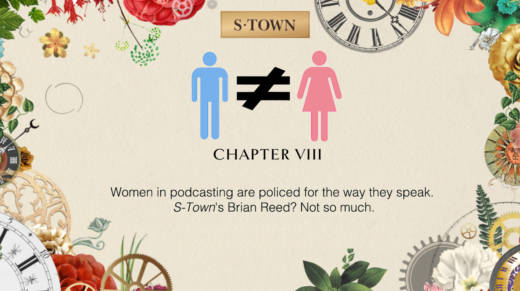This piece was inspired by an episode of The Cooler, KQED’s weekly pop culture podcast. Give it a listen!
S-Town Is A Reminder That We Only Police the Way Women Speak

Everyone is talking about S-Town, a new podcast from Serial and This American Life. And for good reason. The seven-episode series begins as an investigation into a possible murder cover-up, but soon blooms into a heartbreaking character study that touches on the oppression of small-town life, the curse of brilliance, not being able to escape self-destruction, the weight of inheritance, antique clock repair, how punishing time and isolation can be, climate grief, and even nipple rings.
With a narrative scope that touches on so much, it's no wonder that there are approximately 1.2 million think pieces about this podcast, from how it's changing the game, to why the show maybe shouldn't have been made, to whether BDSM or self harm were at play, to why some of the protagonist's neighbors are angry, to what the show gets wrong about the queer experience, to how it fails black listeners. There are many more essays where these came from, and I've read them all. But there's one essay that's missing from the batch.
S-Town’s host Brian Reed is a great journalist, who happens to end his sentences with an upward lilt, as if asking a question. This speech pattern is known as 'uptick.' You probably read about it -- alongside vocal fry and the overuse of the word 'like' -- in 2015, when the internet abounded with pieces on how verbal habits like this are "unprofessional" and "annoying."
These essays all shared the same parts:
- giving voice to people in positions of power -- mostly older white men -- who hate uptick, vocal fry, and the word 'like'
- assigning these habits to women
- encouraging these women to change the way they speak
- a Kardashian or Valley Girl reference
Vocal policing rears its ugly head in the office, for sure, but really explodes in the podcast arena. It's amazing how comfortable some commenters become in criticizing women podcasters, under the protection of anonymity.
Take these reviews for NPR's Invisibilia, for example.
Deweykay writes, “The vocal fry is killing me. Please train your voices to be an instrument for good, not a weapon of destruction and irritation.”
Scott Winner writes, "I love the stories but I just can’t listen to these Valley Girls any longer. I feel like I’m listening to two high school girls.”
Smlp writs, "Wow, the constant vocal fry is obnoxious, distracting and seriously annoying. I can’t listen to this anymore so long as these ladies are the hosts."
Amandaknows writes, "The vocal fry aspect is out of control! It’s hard to take these women seriously. It’s cringeworthy. I mean, these women are adults, right? Do they know how dumb this affectation makes them sound? Like hearing a female give an academic presentation in baby voice or something. Ladies, what’s wrong with you? NPR, I expected more…"
You get the picture. These types of reviews have nothing to do with content, and everything to do with gender.
Ann Friedman, one of the hosts of Call Your Girlfriend, received similar "feedback" for her podcast. In an essay titled “Can We Just, Like, Get Over the Way Women Talk?,” Friedman discusses the negative impact of trying to cater to these critics:
“It quickly became apparent that if we were to take the advice of all of our detractors — carefully enunciating, limiting our likes, moderating our tone to avoid vocal fry — our podcast would sound very different. It would be stripped of its cadence and its meaning; it would lose the casual, friendly tone we wanted it to have and its special feeling of intimacy. It wouldn’t be ours anymore.”
Jessica Grose, a cohost of the Slate podcast, the DoubleX Gabfest, echoed this sentiment on Fresh Air, when discussing how she employed a vocal coach to change her voice after receiving similar criticism:
“I felt like it was blunting my emotional range. I felt when I was self-conscious about my voice it lost that expressive, connective quality … There was something lost when I wasn’t being myself, whatever that is.”
After listening to S-Town, I waited for the think pieces on how listeners couldn't appreciate the content because of Brian Reed's "unprofessional," "annoying," "weapon of destruction and irritation" delivery. But those essays won't be written, because Brian isn't a woman. File this under Things Men Get Away With That Women Never Could: Volume Infinity.
I personally don't care how Brian Reed, or anyone for that matter, speaks. I do care that the same content delivered by a woman with uptick wouldn't be as universally lauded.
Our culture gets hung up on the belief that there are default or "normal" settings to voices, behavior, fashion, gender expression, etc. But it's all conditioning, and constantly evolving. Pink and blue weren't gender signifiers until World War I. FDR wore a dress as a child. The "NPR voice" is all over the radio, not because it's right, but because the types of people who speak like that were the only ones initially allowed in that space.
If some had their way, we'd all continue to fit ourselves into society's molds (this is how you speak, this is how you dress, this is how you behave, this is what you don't do, this is who's in charge (not you)). But the time for that is over, no matter how uncomfortable or upsetting that might be for certain people. Let Brian be Brian, let Brenda be Brenda.

